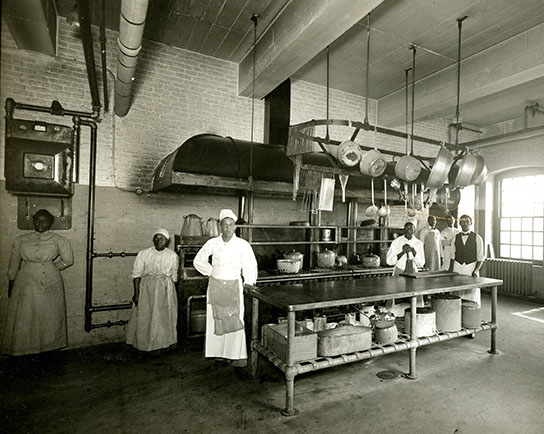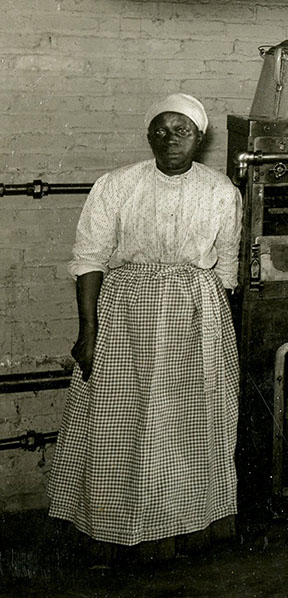As we continue to mark Women's History Month, we return with a different tale about the women who helped make Gilman what it is today.

Today, we'll talk about Matilda. Despite her long service in the early days of Gilman, she is not easy to talk about. This is not because she did something terrible or something terrible happened to her, although that might have been the case. No, we struggle to talk about Matilda because she is only mentioned once, in the memoirs of Ann Galbraith Carey:
"... we had the perfect picture of an old Maryland cook, Matilda, who was with the school for years. I can see her bows and smiles when on a rainy day we had to go through the kitchen to the dining room..."
The picture above, taken around 1912, several years after Mrs. Carey's recollection, shows the kitchen staff at the time. From the description, we can guess that the woman second from the left is Matilda, but we cannot say with certainty since the picture is unlabeled.
 The image is an extreme rarity, as no other group picture of Gilman's kitchen staff is known to exist prior to 1970. For that same reason, it represents an essential piece of Gilman's history. The women in this picture are part of a long line of servants, mostly African-American women, who kept Gilman running through good times and bad through the first half-century of the school's existence. It's important to note that despite their service, they would not be allowed to send their sons to school here until segregation came to an end at Gilman in 1963.
The image is an extreme rarity, as no other group picture of Gilman's kitchen staff is known to exist prior to 1970. For that same reason, it represents an essential piece of Gilman's history. The women in this picture are part of a long line of servants, mostly African-American women, who kept Gilman running through good times and bad through the first half-century of the school's existence. It's important to note that despite their service, they would not be allowed to send their sons to school here until segregation came to an end at Gilman in 1963.
This photo of the kitchen staff picture was only recently discovered. We continue to seek ways we can honor these women and the others who built Gilman, despite being denied the chance to learn here, because of the color of their skin. This project is ongoing and to this point is focused on identifying the people who were often identified by only their first name like Matilda was, or simply as "Staff" in a ledger. It is slow going, but we have been able to uncover some lists of names, particularly from the 1930s.
It is vitally important to the mission of the Gilman Archives to tell the complete story of the school. Women like Matilda have been partially erased by the sands of time, and we need to make sure that future generations of Gilman boys know of their important work. We need your help. If you have information that you think would help with the identification of Gilman's servants, or would like to help in other ways, please email archives@gilman.edu.
